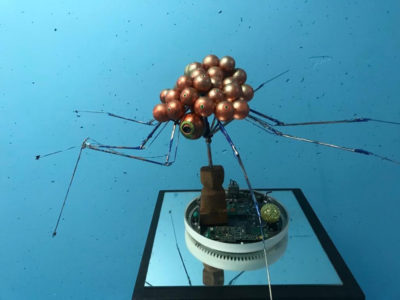The Sacred Talking Drum and the Spider
Originally told by Mrs. Annie Lydie Idime in Mbomo and translated into French by Théophane Bokaka Bouanga.
Retold in Dutch by Heidi Muijen and Tess van Dongen and translated into English by Greg Suffanti – for QFWF- Animal wisdom collection nr. 2
Being proud of your heritage does not mean depending on material possessions, but rather, on one’s spiritual wealth.
There was once an African ancestor who lived with his son in a village community of grass huts. The father was named Lebongi, and he was considered uncivilized, ugly, poor and dirty, with sand flies around his feet and moths in his hair. Still, he must have had some hidden qualities, because he had found a lovely woman with whom he had had a child: a very attractive boy. He was also said to be a loving and doting father.

This son grew up to become a very good drummer. He could make the voice of the instrument, made of animal skin and wood, sound enchantingly beautiful, rhythmic and as modern as any electronic instrument. That is why he was in high demand and was often asked to play in ceremonies. He travelled a lot like this, from village to village, region to region.
Sometimes he was asked:
“Whose son are you?”
During these moments he wouldn’t answer, but would look down at the ground in shame. Although he loved his father deep down, he was embarrassed about him and had left him behind as a memory.
Often weekly and always monthly, he travelled to all kinds of distant regions and even other lands. Eventually, he came to a country where he met a woman, fell in love, married, and had a child. One day he was invited to a dance in his new homeland. He started to play the drum with the palms of his hands as he’d always had. Soon, overcome by the encouragement from the audience, he became enraptured. On wings of enthusiasm, he became increasingly enchanted and careless, and he accidentally broke the outer skin of the talking drum.
“Oooh, sacrilegious Lebongi!”
Shouted voices from the audience:
“You killed the sacred “talking drum”. Now we are going to kill you.”
However, before that death sentence was to be carried out, his executors demanded to meet his father.
“My father? Where can I find him?” Lebongi wondered out loud. “I have ignored him for so long, as if I had banished him. Would he agree and come and support me in this dire situation?”
The voice of his conscience told him:
“Just go look for him, after all, it was he who brought you to this world.”
So he went to the village where his father lived. Given the hopeless prospect of his wife and child having to survive without him, he did not consider fleeing to safety.
When he arrived at his ancestral village, his father, Father Lebongi, was busy in the forest cutting “kosa” stems, which are used to make nets. When Father Lebongi returned to his village, he saw that the “kandza”, or meeting place, had been completely swept clean.
“Who cleaned the ‘kandza’ for me?”
He also noticed that someone had fetched water and poured some into his drinking gourd.
“Oooh what child was it that pampered me so much? After all, I no longer have a son?”
He heard a noise behind the house and went to investigate. There, he saw his long missing son bringing firewood.
“My son, you have grown up. Did you clean the “kandza”?”
“Hello! Yes that was me.”
“Oooh, I’m so glad you’re here! Where have you been all this time?”
Their lives together soon looked like any traditional father and son relationship, and in the evenings, Father Lebongi prepared food and they ate together just as before.
One day, after the evening meal, the son explained his predicament to his father.
“I am already dead. They actually have already killed me. In the village where I got married, I got into trouble. The villagers want to kill me, but before this happens, they told me I had to get my father. They want to execute me in front of my father!”
Father Lebongi somberly replied:
“If that’s the way they want to do it? No problem! As I always say, ‘unpleasant things always find a victim.’ Let’s go, I want to see with my own eyes how they are going to kill you.”
Before they left, Father Lebongi put some kola nuts in his game bag, along with a handful of “ndongolonzomba,” or small, wild chili peppers.
Then the two walked to the son’s village so that the son could meet his fate. That same evening, the village crier informed the entire village that the young drummer had returned with his father, and that the matter would be settled the following day.
The next morning all of the village wise men gathered at the kandza. The boy’s father joined them, and being a bit surly, he sat in between them. He took some kola nuts from his game bag ― a rare treat at the time ― and shared them generously with the other men. After they had chewed on the kola nuts, the session began.
The men asked Lebongi:
“Is that your son?”
Yes, he nodded. Then one of the members of the group continued:
“He made a deadly serious action here, and accordingly, we are not going to kill him without your presence. The issue is that he broke our sacred “talking drum” that has been passed down from generation to generation since our forefathers and is our most treasured object.”
Father Lebongi replied:
“Okay, I understand. And understand me correctly, I do not deny the seriousness of the problem. I will accept your solution. But before my child is killed, I want you to give back all of the kola nuts you’ve just eaten.”
The men shouted in unison:
“That’s impossible!”
When the wise men realized the turn things had taken, they realized they had only one solution. They had already chewed and swallowed the nuts. The same was true for everyone there. Could they cough up the kola nuts? Impossible!
Then the old wise men withdrew behind the house to confer.
“We can’t make this work! Old Lebongi is just as old and wise a man as we are. It is his child. We will not kill him. Let’s rest everything. There is no longer any case, there is nothing more to settle.”
They came back and said that young Lebongi was free to go, having only to pay for the wood, the lianas and the hide.
And so everyone soon realized that this famous musician was the son of Lebongi, whose wisdom came from Anansi, the spider. And this brought great joy to everyone.
